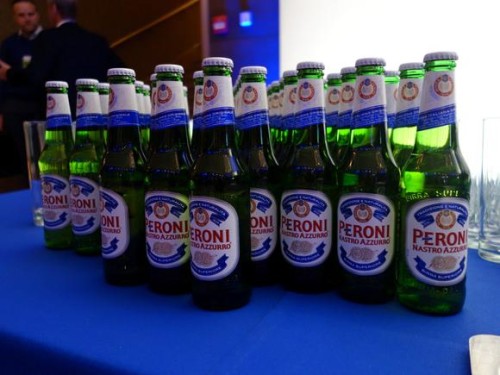Japanese brewer Asahi Group Holdings may have been slower than its peers to expand abroad, but the company is poised to catch up with a string of acquisitions in western Europe.
 Asahi has completed its purchase of four companies, including Italy’s Peroni and Dutch brand Grolsch, from Britain’s SABMiller, which was taken over by the world’s largest brewer, Anheuser-Busch InBev of Belgium. These units rang up about 86 billion yen ($834 million) in sales for the year ended in March. The deal raises overseas sales to about 16% of Asahi’s total, up around 4 percentage points from the estimate for this fiscal year.
Asahi has completed its purchase of four companies, including Italy’s Peroni and Dutch brand Grolsch, from Britain’s SABMiller, which was taken over by the world’s largest brewer, Anheuser-Busch InBev of Belgium. These units rang up about 86 billion yen ($834 million) in sales for the year ended in March. The deal raises overseas sales to about 16% of Asahi’s total, up around 4 percentage points from the estimate for this fiscal year.
Eager for Super Dry
When President Akiyoshi Koji attended a mid-October gathering at a London hotel with representatives of the acquired companies, several asked him when they would be able to start selling Asahi’s flagship Super Dry beer. “There is strong interest in Japan’s beer technologies and brand marketing,” Koji said.
Asahi plans to start producing and selling Super Dry in those locales as early as 2018. Though the product has barely penetrated the Italian and Dutch markets, Asahi thinks room for growth exists if it taps the premium-beer sales channels and expertise offered by Peroni and the others.
Super Dry is sold in about 70 countries. Asahi has achieved some success by marketing it as a premium beer in Asia and elsewhere. Priced 30-50% higher than regular beer, Super Dry is the top premium brand in South Korea and Hong Kong, more popular than Heineken of the Netherlands.
Though western Europe is less promising as a growth market compared with emerging nations, the risk of getting embroiled in price competition is smaller. Premium beer makes up almost half of Italy’s market, and Asahi sees Super Dry gaining some fans there.
The latest acquisition is Asahi’s largest abroad. And speculation exists that the company will buy SABMiller’s beer operations in the Czech Republic, Poland, Hungary, Slovakia and Romania for more than 500 billion yen. SABMiller holds the top market share in four of these five eastern European nations, and its portfolio includes Pilsner Urquell, a Czech brand popular in Europe. Though Asahi says it has no plans regarding any acquisition offer, adding these operations would boost the company’s overseas business.
Foreign expansion vital
For Japanese brewers, strengthening overseas operations is an urgent matter amid grim growth prospects domestically due to a declining birthrate and diversification in consumers’ drinking styles. Beer shipments by Japan’s five largest brewers decreased 2.1% on the year in the January-September period, declining for the 12th straight year.
Asahi began looking abroad in earnest in 2009. The brewer bought the Australian beverage operations of a U.K. company for about 77 billion yen. Asahi subsequently made acquisitions mainly in the Oceania region, including a Malaysian dairy business, while taking stakes in China’s Tsingtao Brewery and a major Chinese food company.
Yet the brewer trails domestic rivals in making inroads abroad. Asahi projects a sixth consecutive record annual operating profit for the year through December, but overseas operating profit before the acquisition in western Europe was about 3% of the total, excluding companywide costs and other factors.
The company earns most of its profit from alcohol, beverages and food in Japan, and this structure has changed little in the past six years. Meanwhile, rival Kirin Holdings is on track to earn about 30% of total profit from abroad this fiscal year.
Letting the money flow
But Asahi has access to funds for a comeback abroad. Koji has said the company will tolerate a debt-to-equity ratio of about 1, noting that Asahi can increase debt to around 1 trillion yen. Based on free cash flow and cash on hand, the company can spend another 500 billion yen or so in addition to the western European deal.
Asahi also said Wednesday that it will end a capital partnership with Kagome, unloading its 10.03% stake in the company for 24.6 billion yen. The brewer is poised to sell off other assets to finance investment in growth.
The merger of Anheuser-Busch InBev and SABMiller gave birth to a giant with a nearly 30% global market share. Asahi stands no chance in trying to match the scale of this goliath, which is more than 10 times bigger in operating profit and market capitalization. Japan’s leading brewer instead faces the test of whether it can grow Super Dry and other products that are fruits of Japanese technologies by leveraging the sales channels of newly acquired entities.

